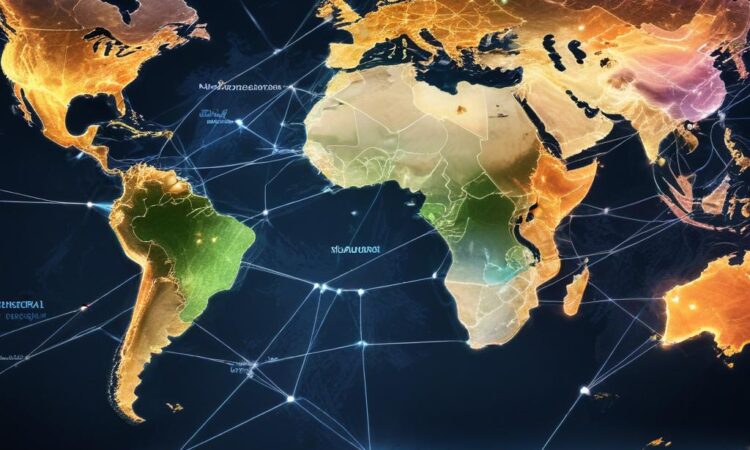Global Trade and Geopolitical Risk: The Impact on Businesses
The global trade landscape is a dynamic and ever-evolving environment. The interconnected nature of economies and the rise of globalization have created unprecedented opportunities for businesses to expand their reach and access new markets. However, this interconnectedness also exposes businesses to a range of geopolitical risks that can significantly impact their operations and profitability.
Geopolitical events, including wars, political instability, and changes in government policy, can disrupt supply chains, create trade barriers, and increase volatility in currency exchange rates. Trade wars and sanctions, often implemented as political tools, can further restrict access to markets and disrupt existing business relationships.
Understanding the Impact on Businesses
The impact of geopolitical risk on businesses can be significant and multifaceted. For companies involved in international trade, the consequences can be particularly severe:
- Supply Chain Disruptions: Geopolitical events can disrupt supply chains, forcing businesses to find alternative sources of raw materials, components, or finished goods. This can lead to production delays, higher costs, and potential shortages.
- Trade Barriers: Trade wars and sanctions can create new tariffs, quotas, or other restrictions on imports and exports, making it more expensive or difficult to do business in certain countries. This can reduce market access and profitability.
- Currency Volatility: Fluctuations in exchange rates caused by geopolitical events can impact the value of foreign currency earnings and expenses, creating uncertainty and potential losses.
- Political Instability: Unrest and instability can create a hostile business environment, making it risky for businesses to operate or invest in certain regions.
- Reputational Damage: Involvement in countries or activities perceived as risky or controversial can damage a company’s reputation and potentially lead to boycotts or sanctions.
Strategies for Mitigating Geopolitical Risks
Businesses can mitigate geopolitical risks and navigate the complex global trade environment by adopting a proactive approach:
1. Diversify Markets and Supply Chains
Reducing reliance on a single market or supplier can help mitigate the impact of disruptions caused by geopolitical events. Diversifying markets and supply chains can spread risk and provide flexibility to adapt to changes.
2. Conduct Thorough Due Diligence
Before entering a new market or establishing a business relationship, conducting thorough due diligence is crucial. This involves assessing the political, economic, and legal landscape, as well as the potential risks and opportunities.
3. Develop Contingency Plans
Having contingency plans in place for various scenarios, including disruptions to supply chains, trade restrictions, or political instability, can help businesses respond quickly and effectively to unforeseen events.
4. Engage in Lobbying and Advocacy
Participating in industry associations and lobbying efforts can help businesses influence policy decisions and advocate for trade policies that support their interests.
5. Build Strong Relationships with Governments and Institutions
Developing strong relationships with governments, international organizations, and other stakeholders can provide access to information, support, and influence on policy matters.
6. Embrace Technology and Innovation
Adopting new technologies, such as blockchain and artificial intelligence, can improve supply chain transparency, reduce costs, and enhance risk management capabilities.
Navigating Complex Global Trade Environments
Navigating the complexities of global trade requires a deep understanding of trade agreements, regulations, and customs procedures. Businesses must:
1. Understand Trade Agreements
Familiarizing themselves with the terms and conditions of trade agreements, such as the World Trade Organization (WTO) agreements or regional free trade agreements, is essential for navigating international trade.
2. Comply with Regulations
Adhering to import and export regulations, including those related to tariffs, quotas, labeling, and product safety, is crucial to avoid delays, fines, or legal repercussions.
3. Manage Customs Procedures
Understanding and complying with customs procedures, including documentation requirements, customs valuations, and inspection processes, is critical for smooth cross-border trade.
4. Employ Trade Finance Tools
Utilizing trade finance tools, such as letters of credit, documentary collections, and export credit insurance, can mitigate payment risks and facilitate international transactions.
Case Studies: Impact of Geopolitical Risk on Businesses
The impact of geopolitical risk on businesses can be seen in various real-world case studies. For example:
- The US-China Trade War: The ongoing trade war between the United States and China has led to increased tariffs on billions of dollars worth of goods, creating uncertainty and disrupting supply chains for businesses on both sides.
- The Russian Invasion of Ukraine: The war in Ukraine has had significant implications for global energy markets, disrupting supply chains and creating energy shortages in Europe. This has affected businesses across various industries, including manufacturing, transportation, and agriculture.
- The COVID-19 Pandemic: The global pandemic has highlighted the fragility of supply chains and the importance of diversification. Governments imposed travel restrictions and lockdowns, leading to disruptions in global trade and impacting businesses worldwide.
Conclusion: Embracing Resilience and Adaptability
The global trade environment is characterized by constant change and unpredictable risks. Businesses must embrace resilience and adaptability to thrive in this complex landscape. By understanding the nature of geopolitical risk, implementing mitigation strategies, and navigating complex trade environments effectively, businesses can enhance their competitiveness, manage risk, and achieve sustainable success in the global marketplace.

